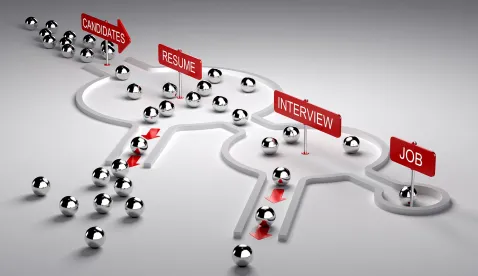From the IMS Insights Podcast Vault: Dr. Chuck Cowan, economics and statistical expert, offers his insight on HR analytics and the value of human capital in a post-pandemic economy. Listen above or read the interview transcript below. (Originally recorded May 2021)
Hello and welcome to the IMS Insights Podcast. Today, we’re speaking with esteemed economist and statistical expert Charles Cowan, PhD, about HR analytics and the importance of human capital in a post-pandemic economy.
Dr. Cowan is the Chief Executive Officer and co-managing member for the national statistics, finance, and economics consultancy, Analytic Focus. With more than 40 years of experience, Dr. Cowan is an IMS Elite Expert, specializing in the development of financial research and its use in improving shareholder values, economic impact studies, and risk management.
Teresa Barber:
You’re kind of segueing into something I’d like to ask you a little bit about too, Dr. Cowan, HR analytics. What exactly is HR analytics, and why is it so important right now?
Chuck Cowan:
Well, HR analytics is just the application of analytical tools to problems that you see in human resources. So we offer some support in HR analytics, but I also do quite a bit of review of textbooks and methodologies that are used in HR analytics. Right now, the big concern for many firms or I’m sorry, pre pandemic, the big concern was staff retention because that’s a huge, expensive that people suffer. And it impacts them in a lot of ways. With the pandemic, many people were laid off. Companies are now trying to bring people back.
Chuck Cowan:
So some of the analytics go into how many people should I bring back? What should I pay them? How do I retain them once I get them back? What is it going to cost me to train these people? There are all sorts of new questions coming in that were secondary questions, pre pandemic, but now are top of the mind questions because there’s a wave of hiring going on in many industries. In other industries, as you diversify and move people out of the office, then there’s the question of, well, what’s the cost benefit of retaining some people that I may not need because I don’t need to have as many people, if the people that I’ve got are more productive and have more time, because they don’t have to sit on the subway for two hours each way, or for Los Angeles, four hours on the expressway each way, which makes for a really long day.
Teresa Barber:
So, is there a trade-off between paying current employees versus retaining them long-term? Can you talk to us a little bit about core teams, core competencies and building long-term value?
Chuck Cowan:
I can, and I can even give you a good example of where this is important. So in a lot of cases, this is true even in my own office, people who join your company, it takes them anywhere from three months to a year to ramp up, to really understand what it is you’re doing, what it is you’re offering, what the customer needs, how to interact with customers. And it’s a long-term training process, not so much in the skillsets that they’re bringing to the table, but rather how to fit those skillsets into the milieu that you have for your business.
Chuck Cowan:
So if you’ve ever gone to a restaurant that just opened, you’ll notice that the service is not the greatest and the reason is because those people haven’t worked together before, and they may have gone through training and they may have interacted some with each other during training and during dry runs and a good restaurateur will make sure that they do a fair amount of that before they actually open a restaurant, but the truth is, is that even if it’s a chain and they’ve been around forever, once they open a new location, that new location suffers for two or three months, until everybody figures out what everybody else is doing, and there’s reasonable interaction and supervision over everything that’s going on.
Chuck Cowan:
So, I think everybody’s been through that experience where you go to the new restaurant, and you’ve got these high expectations. I go to the new restaurant with low expectations because I’m figuring that they haven’t worked together long enough to know how to interact with each other. And so we have a couple of good examples of that not too far from where I live, regarding a new opening. And you think this is a great place and you’ve been to this restaurant before in other locations and it disappoints you. You have to let them kind of mature. So I think that what you’re going to lose here is in companies, you’re going to lose some of that because people don’t have that interaction. They don’t have the hallway discussions; they don’t have the opportunity to pursue new ideas or find out what somebody else is doing.
Chuck Cowan:
I think in another conversation you and I had, I talked about when I was at the census bureau, I learned all sorts of fascinating stuff from other people who were working on other projects, but we would talk about what we were doing and you’d get this breadth of information about things that people were doing and how things worked that you can’t get online because you’re only talking to your group and you’re not running into people or making these connections that are intrinsic to the learning process. So I see that as a real downside in the pandemic in the way. I also think that HR analytics programs right now just don’t think about that at all, because it’s been around for so long and people are so used to that type of interaction that once it’s removed, how do you model that without actually thinking about adding a component to the HR analytics offerings that you have?
Teresa Barber:
Yeah. I wanted to ask you a little bit about that because you’re almost talking about these intangible aspects that help companies innovate, share ideas across departments, across groups that might not otherwise be deliberately interacting with each other. There’s this intangible stuff that’s there and you mentioned you’re reviewing textbooks and looking at lots of different models and approaches for using analytics to make those HR decisions or decisions about investment. Do we keep this brick and mortar office? Do we not? What are we going to lose? How relevant, how current and how equipped are most of the models that are out there right now to help companies and firms really address this stuff?
Chuck Cowan:
Well, I don’t think that they’re real well equipped right now. And I don’t mean to disparage the models or the companies that are doing this. It’s just that they’re in a new time and they haven’t caught up yet. So I’ll give you a couple of examples. One is employee engagement. There’s a lot of controversy about whether or not to measure employee engagement, and what it means. Well, in the past, employee engagement had to do with the measurement of how engaged you were within the job that you were holding and your expectations for promotions and how you got along with your coworkers and stuff like that. Well, if you’re in a manufacturing setting and you are working in a warehouse, all of those still apply because you’re not going to be able to work in a warehouse over the internet. So for those types of businesses, I think the HR analytics models don’t have to adapt much with one exception, which I’ll come to in a second.
Chuck Cowan:
But again, every time we talk about what’s the impact of the pandemic and the use of the internet and electronics, we’re really talking about different classes of businesses. Because if you’re in manufacturing and everybody’s got to be on the assembly line, that’s not changing. If you’re in an office setting and you’re offering financial planning, or you’re a law firm or whatever, and now everybody’s working remotely, then you’ve lost something significant and that something significant is where people interact and exchange ideas, because it’s just that much harder to do, unless there is an intervention of some sort that brings that around.
Chuck Cowan:
So to answer your question, I think the models are still good for some things. I think they’re not so good for others, but then there’s one other change, which is, you’re seeing a lot more competition for workers in the market space now. So just this morning, there was news about McDonald’s now offering $15 an hour to work at McDonald’s at the lowest levels, but they’re modifying their pay at all levels for retention. And to recognize that as people are progressing through McDonald’s as part of their careers, they need to have an expectation that they’re going to do better by staying with McDonald’s, than switching over to some other form of employment.
Chuck Cowan:
So in terms of retention, so it used to be that the big worry was about retention. Now the big concern is bringing people in and getting the best of the people because the other problem is if you’re offering $15 an hour and somebody else is offering 13 bucks an hour, you tend to get the pick of the best people for the 15 bucks an hour. And then guess where the people that you didn’t hire go. Now you go to the $13 an hour. Well, they recognize that they’re getting less money, but you picked the best so those people who are going to these other positions are not the same quality of person in terms of work ethic or what they know. And so what happens there is, is that you either have to learn to compete against the other firms that are hiring, or you’re going to have to have a different expectation about your employees versus their employees.
Chuck Cowan:
So I’m bringing this up because I don’t know of any models out there right now that look closely at competition, and even pre-pandemic there were no models that looked at competition or this particular resource, which is your workforce. So now that there’s more and more competition, and there’s a much better exchange of information among people than there ever used to be, what you find is that the models don’t allow you to think about, “Well, if I do this, what are my competitors going to do? Do I get into some sort of cycle where I make a change, they make a change, somebody else makes a change?” I have to make a change in return. And you cycle to a new position in the marketplace, as opposed to you just making a change as if there were no other businesses in the world. That’s unrealistic. And it’s really that thinking about how unrealistic that is, is really heightened these days because of the problems with people not having workers that they need to hire.
Teresa Barber:
Makes sense. I hear you talking, it’s almost more of a dynamic model that firms really need to be able to have a clear view or at least the best possible chance you can have to have a clear view of all the likely ‘what if?’ scenarios, right?
Chuck Cowan:
Right. And even in like office positions, if you’re working from home, and you don’t care about your surroundings because you’re working from home, that makes it easier for you to transition from one place to the next, because you don’t have a lot of friends around you that you are tied to, or you don’t have a mentor, you don’t have as close a relationship with a mentor as you might’ve had previously. So even in those settings, competition I think, between companies for top talent is only growing stiffer than it ever was before.
Thank you to Dr. Charles Cowan for speaking with us today, and a special thanks to our listeners.





 />i
/>i
